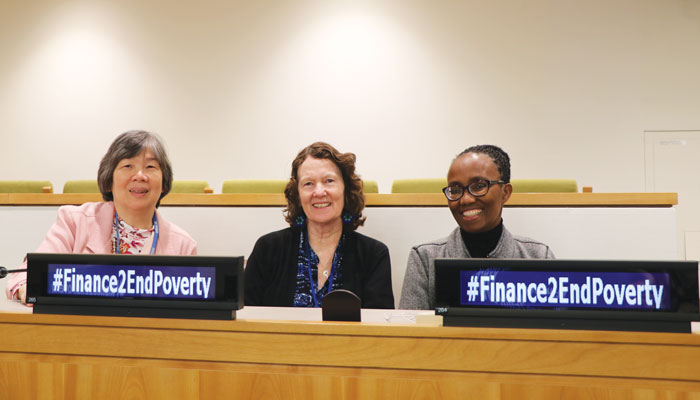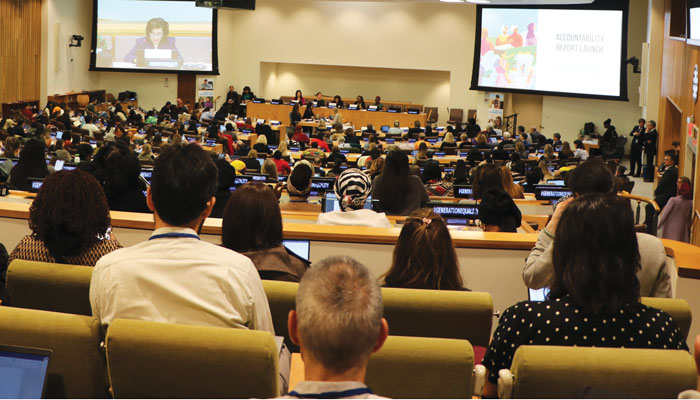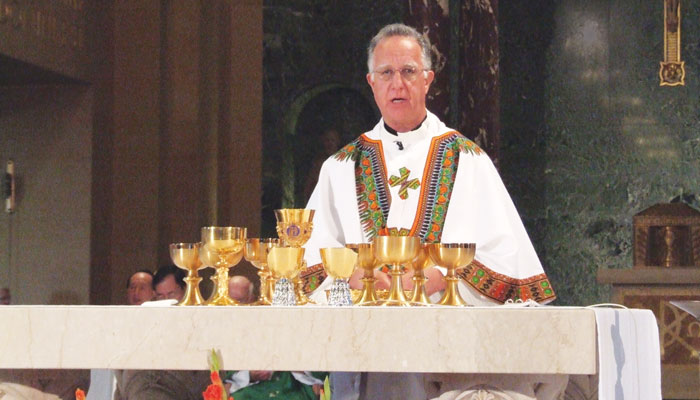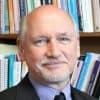Missioners bring their experiences of and among the marginalized to a global forum
The United Nations headquarters in New York City might not seem like mission territory, but for Maryknoll and the missioners who serve there, it very much is.
For Maryknoll Sister Margaret Lacson, the distinctive U.N. building on the East Side of Manhattan is a long way from her native Philippines or Japan, where she spent 30 years in mission. Yet, growing up in a developing country and then serving vulnerable people gave her the kind of experience that Maryknoll seeks to bring to the U.N.: voices from the margins.
After taking her first vows in 1992, Sister Lacson questioned her assignment to Japan, a developed country.
“But then, God has mysterious ways,” she says. “I said, ‘OK, this is a first-world country, but the situation of women is not that of a first-world country, so I will focus on the women and women’s issues.’”
She worked with victims of domestic violence, initially with Japanese women, and later with Filipino migrants. Some suffered not only physical abuse but also what Sister Lacson calls cultural violence.
“’You Filipinos are no good,’” she says, echoing how some abusive men would address their Filipino wives. “’You don’t know anything.’” These husbands, she continues, would tell their spouses not to cook Filipino food — or even to see friends. “‘Your friends cannot come here in my house. You are in Japan; you have to speak Japanese.’”
Sister Lacson brought this knowledge and experience with her in March to the 68th Session of the Commission on the Status of Women. There she attended various events around such topics as gender equality and the role of women in preventing and resolving conflicts.

Sister Lacson’s other areas of focus at the U.N. are social development, climate change and care of creation. She sits on the Committee on Financing for Development and a subcommittee on climate finance, which deals with the impact of climate change on poorer nations and Indigenous communities.
While Sister Lacson serves as the official Maryknoll Sisters representative to the U.N., Maryknoll Father John Sivalon serves as the representative for the Maryknoll Fathers and Brothers. The two missioners work through the Maryknoll Office for Global Concerns (MOGC), which was established in 1997 by the Fathers and Brothers, the Maryknoll Sisters and the Maryknoll Lay Missioners as a collaborative ministry for peace, social justice and the integrity of creation.
“We have a voice in terms of representing the people that we serve around the world,” Father Sivalon says.
“We are one among a number of religious organizations, faith-based organizations, that are approved as an NGO [nongovernmental organization].” This “gives us the ability to have input, especially around economic and social development issues, sustainable development goals,” he says.
Father Sivalon, who joined the MOGC ministry a year ago, brings to the U.N. his background as a missioner for 25 years in East Africa, as well as a term as the Society’s superior general from 2002 to 2008. His focus at the U.N. is on issues related to migration and to extractive industries, particularly mining.
The missioner’s work on mining issues is deeply personal.
“Growing up in Butte, Montana, was integral to my joining the Mining Working Group at the U.N.,” Father Sivalon says. As a child, he explains, his neighborhood bordered an open pit mine. “Every day our house was rocked by blasting that was being done in the pit,” he says.

“Eventually the expansion reached our block and a decision had to be made, to accept money or alternative housing for our house. While those discussions were going on, unfortunately my father had a heart attack and passed away.”
That mine, the Berkeley Pit copper mine — opened by the Anaconda Copper Mining Company in 1955 — is now closed, but remains one of the nation’s largest Superfund environmental disaster sites.
“Three communities were destroyed and an open pit mine sits idle, filling with toxic water, a gaping scar on Mother Earth,” Father Sivalon says. “I have witnessed first-hand the destruction that happens from extractive industries not only to the physical environment but also to the social and cultural environment of communities.”
Mining and migration overlap, the missioner continues. The impact of climate change and the move toward non-fossil fuels are both causing people to be displaced. He cites the Congo River Basin in Africa as an example. There, the push to develop so-called “clean energy” is having devastating effects because of mining for the precious minerals needed in new technologies.
“The river basin itself takes up six countries in Africa, and each one has their own specific kind of minerals being mined,” he says. “The toxins coming from each one is very different [as are] the effects they are having on children.”
Lisa Sullivan, a returned Maryknoll lay missioner who served in Venezuela, now follows issues of faith, economy and ecology as a program officer for MOGC. She echoes Father Sivalon’s concerns. “As we transition to clean energy, there’s a mega push for minerals,” she says. “So, as usual, who do we sacrifice? Indigenous communities, poor communities.”
Sullivan, who is based at MOGC’s offices in Washington, D.C., attends U.N. climate conferences, including the latest COP28 conference in Dubai in the United Arab Emirates last December. Sullivan was accompanied by Maryknoll Sister Susan Nchubiri, who also works at MOGC in Washington and who focuses on migrants and refugees, as well as human rights in the Holy Land.

The minerals needed for new technologies are often on Indigenous lands, points out Sullivan, who attends sessions of the U.N. Permanent Forum on Indigenous Issues. She also came to New York for the Commission on the Status of Women.
“Women are disproportionately affected by climate change,” Sullivan says, citing Africa as an example. “Women fetch water and get firewood, right? With climate change, water is increasingly hard to find. So you add those hours that they’re fetching water or firewood. And the heat has gotten so much greater,” she says. “All those things are just a huge burden on top of everything else that women carry. The idea is to involve women leaders in climate change solutions.”
As societies move from the fossil fuel era to more sustainable energy, the emphasis is on transitioning in a way that will ensure that the communities being contaminated, or that potentially will be affected, are consulted, she says.
“We feel we have the pulse of the people and the issues and the places that often aren’t at that table,” Sullivan says. “That’s our gift, Maryknoll’s incredible gift, to be so inserted in those margins and global conversations.”
Father Sivalon says that Maryknoll, along with the other religious groups with NGO status at the U.N., brings a faith perspective to the table.
“Out of our commitment to Christ we have this obligation, to represent policies that would be most helpful for the vast majority of people,” he says.
Featured image: Maryknoll Sister Margaret Lacson, the Maryknoll Sisters representative to the United Nations, is shown at the U.N. headquarters in New York. (Lynn Monahan/U.S.)
![]()

